Over the past decade, artificial intelligence has proven to be the driving force behind the next phase of the evolution of video games. China recently officially recognized gaming as a profession, has not hidden its intentions to become one of the leaders of this industry. So, how do big names use artificial intelligence in China’s video games?
AI in the video games industry in China: usages and opportunities
Of course, the first application of artificial intelligence in China’s video games aims at improving the gaming experience. For example, Tencent, NetEase, and Changyou, who are the leaders in the Chinese video game industry in 2019, have all used a speech recognition system to improve gaming immersion. This allows players to convert their voices into texts or instructions in the game and keep their hands free.
As far as mobile games are concerned, the advances in artificial intelligence are rather the same, and fortunately given the size of the mobile game market in China. According to the iResearch Institute, the size of the Chinese mobile gaming market was more than 100 billion RMB in 2018.
Recently a small AI mobile game went viral on Wechat. The game called Caihua Xiaoge (猜画小歌)is based on image recognition. The challenge for players is drawing pictures accurately so the games image recognition algorythm can recognize what the picture is. If the computer can correctly identify your drawing, then you move onto the next stage. A little game experience that many Chinese people have enjoyed, and that would not have been possible without the image recognition technology.
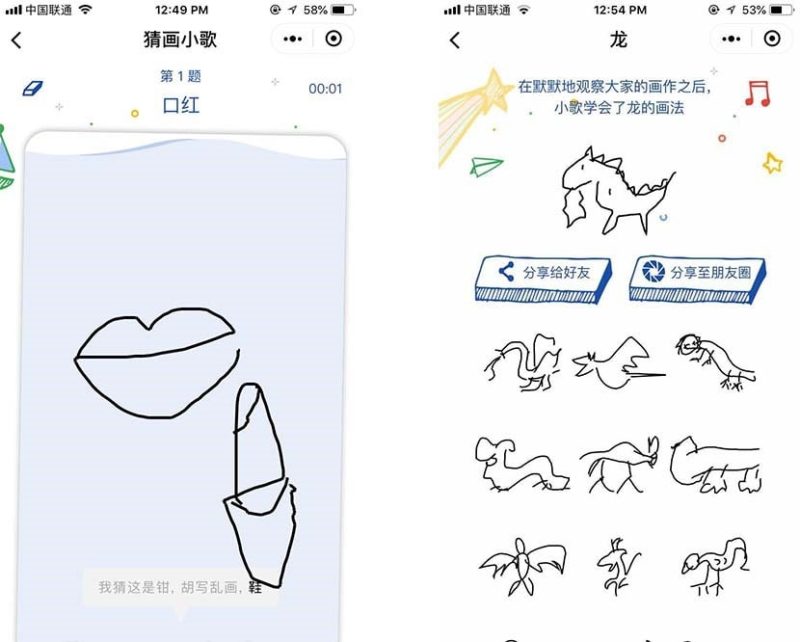
Finally, intelligent recognition can be used in another way. Not to improve the experience for gamers, but to improve the standards of the video game industry in China in general.
Tencent announced last year that it would use facial recognition to manage the hours players spent in front of the screens, especially the youngest ones. This artificial intelligence system aims to limit the playing time of children under 12 to two hours per day. Tencent thus records the players’ faces and thanks to national data, blurs the game screen or blocks the connection. This system has been implemented on the multiplayer online battle game Honor of Kings, also known as 王者荣耀 (Wángzhě Róngyào) in China, one of the most popular video games in China.
After several trial phases where Tencent realized that thousands of Chinese children were trying by all means to divert the limit, the company decided to apply this age restriction system to 10 of its most popular games.
AI in esports in China
Artificial intelligence is also used in the esports industry in China.
In 2018, China’s eSports industry was worth more than $13.8 billion, an 18% increase over the previous year. According to the Chinese Gamma Data Institute, the total number of players has also exceeded 400 million.
Indeed, AI in esports in China can help to improve the playing tactics of professionals gamers. This is the case of the artificial intelligence designed by Tencent’s AI team to beat the professional players of Starcraft II.
Starcraft is a very popular game in China (星际争霸) and has four teams of well-known professional players who participate in international tournaments representing the country. Thus, the defeat of the professional players TLO and MaNa (German and Polish) against artificial intelligence shocked the gaming community in China.
But it also means that today, artificial intelligence in China’s video games has advantages for the professional industry: it is a new way to train players.
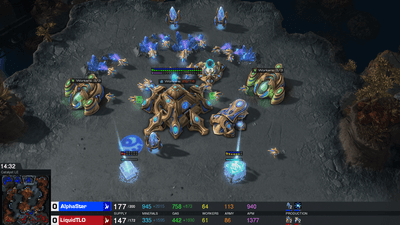
AI in video games creation
In China, artificial intelligence is also used to accelerate or improve the video game creation process. First, when it comes to working on NPCs (nonplayer characters). Artificial intelligence in China’s video games, therefore, makes it possible to make the behavior of these fake characters more natural and reactive to the players actions.
NPCs can either have simple reactions based on a predefined sequence by the computer or react differently to each player’s action.
However, we know that today’s great adventure video games, even with a large budget, do not always use this type of AI. The risk is that artificial intelligence makes NPCs too unpredictable and that it ruins the game’s history written by creators. Thus, until creators have found a middle ground for the use of artificial intelligence in China’s video games, NPCs that are smarter than players are yet in store for tomorrow.
For the moment, artificial intelligence is mainly used to make the graphics and movements of characters as realistic as possible, like in the Tencent video game, Ring of Elysium, known and loved for its very high-quality graphics.

In addition, the use of AI in video games can reduce some production or testing costs.
Evaluating artificial intelligence with video games
Finally, and even more interestingly, artificial intelligence in China’s video games is not only used to improve the game or its creation. It can be used to test the power of AI because video games are a good reality test.
Researchers around the world are working with video games to help machines develop. The aim is to use the virtual schematics of video games to test the skills of intelligence systems when it comes to, reacting to the environment and learning from their mistakes. Some examples where algorithms for other real-world practices, such as using a virtual driving game to test an AI for autonomous cars, are used.
Tournaments between gamers and artificial intelligence are also organized to test the power of an artificial brain against a real human brain. In China, in 2016, Google’s AlphaGo algorithm faced one of the best players in the world’s Go game, Ke Jie.

The victory of this artificial intelligence is proof that games and video games are an excellent way to test, because they provide structure, repetition, and reinforcement.
Therefore, video games have ,been used for decades in China as a means of testing and evaluating the power and performance of artificial intelligence systems in situations that mimic reality.
The success of VR games in China
A large market expected to reach 45.09 billion USD
Of course, artificial intelligence is at the heart of the latest success of the video game industry in China: VR games.
According to Grand View Research, the virtual reality game market size in China is expected to reach USD 45.09 billion by 2025. An ‘immersive’ game experience where players put on a VR headset and use controllers to maneiver around the virtual world. Horror, adventure, strategy, dance, and even flight or travel simulations are available.
Recently, a VR game in China went viral on Weibo. A game that allows Shanghai residents to practice sorting waste just before the new law on waste sorting is implemented in July 2019.
The principle of the game is probably one of the simplest in the world. However, it was a great success; some people even made long queues to play.
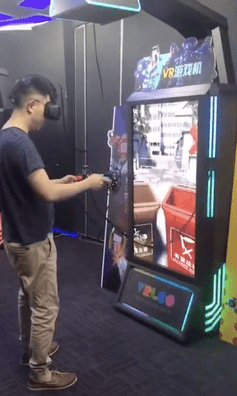
VR facilities on the rise
Despite the success of VR games in China, the purchase of personal headsets is too expensive for most Chinese people who are not big gamers. People who want to try VR games in China must find places where it is possible to play at a lower cost. This can be in shopping malls where more and more activities are offered in VR, in cafés or even in cinemas.
Amusement parks are also an excellent place to test VR activities, as highlighted in the HTC Vive report, which showed that 70% of respondents were interested in attractions with VR in amusement parks.
This success has also resulted in the opening of VR facilities, spaces dedicated to VR activities and VR games in China. According to a recent report by the iFanr Institute, in 2018 there were 50,000 VR arcades in China.
Among them, there are two big names which have made their fortune thanks to this VR arcade concept: Seekers VR, which is based in Wenzhou and owns a franchised chain of 200 arcades in more than 70 cities across the country and Xigua which has nearly 100 “Player No. 1” VR arcades across China.
In Shanghai, players have many options of VR facilities, so competition is becoming more and more tense, and the criteria are often price-oriented. Here is a list of the best competitors, with an idea of the price for each:
- MacHouse: A sizeable bright space which looks like an old bowling alley from the 1980s, equipped with the HTC Vive. Price: 388RMB for two people for an hour
- Mofamen: Friendly atmosphere, equipped with the HTC Vive Pro, in bonus the green background to record yourself in the game. Price: 119RMB per person for an hour
- Joy’s VR: Large choice of VR games and VR headsets, HTC Vive Pro, Oculus and PlayStation VR. Price: 170RMB per person for an hour
- VR+: An arcade with rooms adapted to the game you want to play (example playing a horror game in a bloody fake prison). Equipped with the Oculus Rift. Price: 48RMB for a 20-minute game
- Star Trek: A VR facility around the StarTrek theme. Price: 98RMB for an hour
- Chuangyi Zhigu VR: An arcade built in a large apartment with a wide choice of VR systems. Price: between 98RMB and 128 RMB for an hour
- VR Better: A VR facility on the theme of science fiction in an apartment where you can also drink and eat. Price: between 100RMB and 128RMB for an hour
- Qingxing Mengjing VR: A place at the forefront of the latest VR innovations in a more natural environment. Price: between 87RMB and 138RMB for an hour.
Top VR headsets in the video games industry in China in 2019
However, the VR headsets market is still growing and unfolding many opportunities. In its Global Entertainment and Media Outlook 2017-2021, PwC found that China’s demand for VR headsets will reach 85.9 million within five years, overtaking the US’s projected 68 million.
When asking Chinese gamers what criteria they consider when choosing a VR headset, comfort comes in first place with 46%, then following screen resolution with 44%, convenience 40%, good content 40% and precise control 40%.
Thus many international players are fighting to win the hearts of Chinese consumers, including HTC, Oculus, and Sony.
For example, the best-selling headset in China is the HTC brand, which alone takes 33.1% of the market share of the Chinese VR headsets market. However, major international brands such as Oculus and Sony are finding it more difficult to penetrate the Chinese market. Oculus only launched its VR headset in China in January 2018. Aafter HTC, the market is dominated by domestic players.
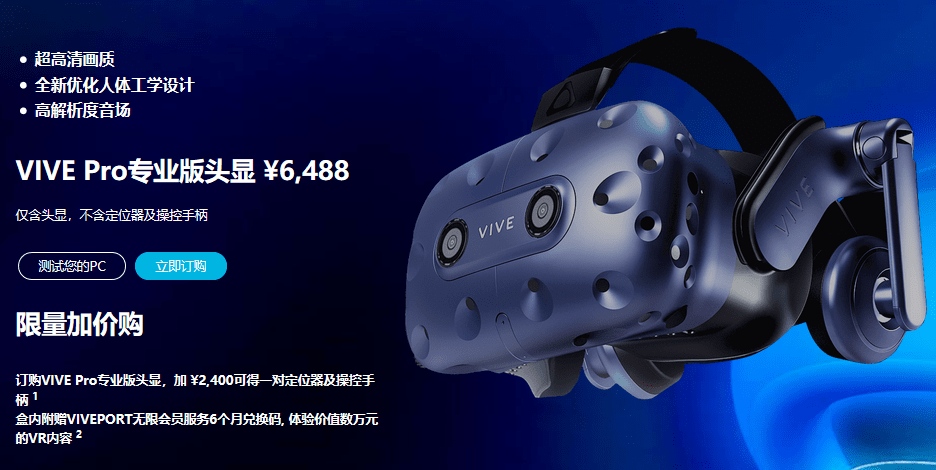
The second and third most popular VR headset providers in China are Pico and DPVR with 28.5% and 13.3% of VR market share, respectively.
More recently, the Chinese video platform iQiyi also released a new VR headset called Qiyu 2S.
How to partner with an AI company in China in the gaming field?
AI partners in China for gear
- ANTVR
ANTVR is a Chinese company dedicated to VR and AR systems. After a round of investment, thanks to Sequoia Capital, the company founded in 2014 has sold more than 1 million VR products worldwide. Several collaborations with brands such as Lenovo, One Plus, and Motorola make it an excellent AI partner in China. One of its flagship products is its technology made for VR game in China called ANTVR Cyclop, which features the latest technological innovations and is compatible with Steam.

In addition, ANTVR open sources its hardware for developers to create games for the kit.
- DPVR
DPVR is today considered the world-leading VR technology company. Based in Shanghai, its products have been sold across more than 100 countries. Since its foundation, the company has received investments from many listed companies and investment institutions such as Xun Lei technology, Kai Ying technology, and Ao Fei which prooves its potential as an AI partner in China.
Through research and innovation, DPVR aims to build user-friendly VR Products and solutions for everybody to easily enjoy the VR gaming experience.
The company develops headsets for video games, movies, and music but also complete kits dedicated to playing VR games in China such as the E3 Polaris:

According to the research institute Canalys, with 24% market share, DPVR accounted for the largest market share among the mainland China VR brands. So it is also a very good choice if you want to partner with an AI company in China.
- Pico
Pico develops innovative VR products which enable users to experience VR easily.
Founded in 2015, Pico is now huge all over the world (US, Europe, China, Japan) with over 300 team members. The company has developed its own platform called the Pico Digital Platform, which features games, apps, and videos from a variety of developers and publishers. They have around 150 apps and games available and can work directly with developers who want to create a game or app for Pico devices, convenient for an AI partner in China.
One of their best products is the Pico, which is an all-in-one VR headset which offers real freedom in the gaming experience. It enables movements in all directions, which is perfect for games with total immersive VR experience without wires or phones.

AI partners in China for technical savoir-faire
- Dgene
Dgene, founded in May 2016, is a VR solution provider based in Shanghai. The company has worked in different industries such as real estate, education, tourism, healthcare, and of course, digital entertainment.

Dgene develops VR solutions with light-field technology to provide 360 3D reconstructions. It’s an imaging technology which would be very useful as an AI partner in China to work on ultra-realistic reproduction of real-world for video games.
The company won 100 million RMB funds from IDG Capital in 2018 and also received 1 billion-dollar fund, from Alibaba (co-investors: Safran Fund; GSR Ventures Venture) and angel funds of 45 million RMB from Shanghai United Investment. It means that today Dgene has a lot of plans to develop and invest: they plan to expand the 3D reconstruction technology into our mobile phones via the camera.
- Realis
Realis offers an optical camera tracking system for virtual reality. It works like a target tracking software which can be based on multiple cameras to obtain the right two-dimensional data and real-time calculation. Their system uses cameras to capture the data to identify the trajectory of tracking objects. They can be a beneficial AI partner in China because their cases include gaming, and they offer installation as well as packaged equipment rental program.
With years of research and development overseas, their team is able to develop independently low-latency and high-accuracy VR solutions.
As a potential AI partner in China, Realis has previously worked in the video games industry in China producing PVP games with multiple players at the same scene. They are now working on the future of VR games in China: offsite online VR gaming. Players in different cities will be able to play together in the same VR battle.
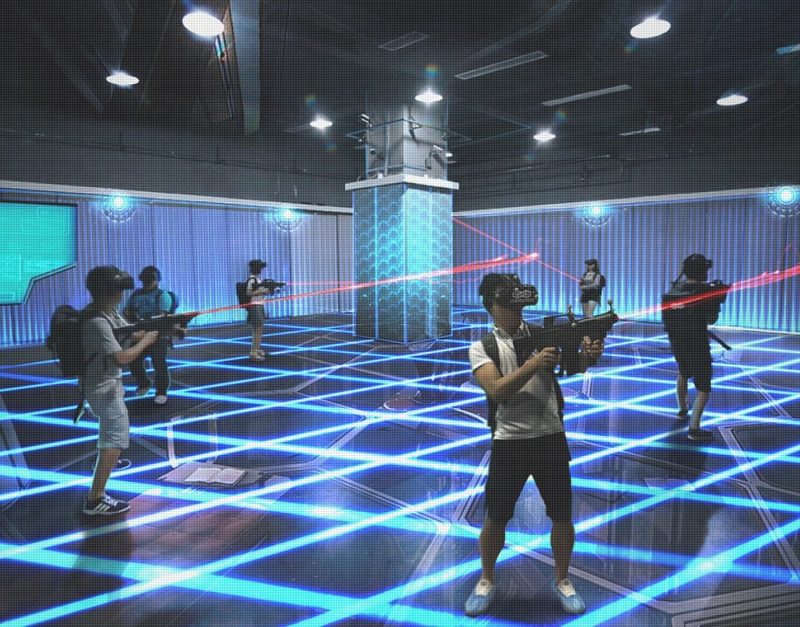
The use of artificial intelligence in China’s video games is expanding rapidly. Its interest is that it can be used for many different things, whether to improve the gaming experience and game creation or to help machines learn and grow. Gamers in China still see AI in video games as something very innovative and therefore attractive. Additionally, the recent wide-scale adoption of 5G networks is expected to further boost the VR development.
This promises to be a great time for VR video games and AI applications in China’s video games industry.
Author: Steffi Noël





